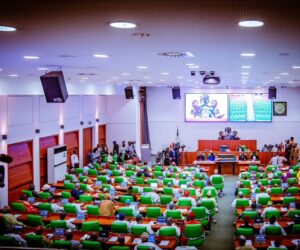The House of Representatives recently indicted 31 federal Ministries, Departments and Agencies (MDAs) for financial infractions totalling over ₦103.8 billion and $950,912.05. The indictment follows damning revelations from the 2019 and 2020 Auditor-General’s reports.
The lawmakers requested that the Economic and Financial Crimes Commission (EFCC) and the Independent Corrupt Practices and Other Related Offences Commission (ICPC) recover the sums from the indicted agencies.
However, the leadership in most of those agencies has changed, and the individuals who supervised the alleged misappropriation of the funds have since left office. Therefore, the question on the lips of concerned citizens and transparency advocates alike is simple: Who were the officials in charge when these happened, and what can be done to prevent a recurrence?
“Some (of those indicted) have been given ministerial appointments, some elected as governor, some elected and appointed in various capacities. You cannot fight against corruption when you have that kind of situation,” said Auwal Musa, executive director of the Civil Society Legislative Advocacy Centre (CISLAC).
“MDAs that flout fund management rules should be put on a blacklist for further funding. NASS should not approve their annual budgets,” said Mboho Eno of the Centre for Journalism, Innovation and Development.
This question on culpability and prevention is not rhetorical. It cuts to the heart of Nigeria’s governance crisis, where infractions are blamed on institutions, while actual humans who sign the cheques, approve illegal transactions, and preside over financial recklessness, walk away without sanctions.
Institutions do not misappropriate funds; people do, and the breaches are varied but united by one constant: leadership failure.
PREMIUM TIMES researched the leadership faces behind the indicted MDAs, relying on public service records, official appointment dates, and news reports.
Below is a comprehensive analysis of who led some of these institutions when the funds went missing and what this means for Nigeria’s accountability future.
This does not suggest that the individuals are guilty of any crime: none of them has been directly accused or prosecuted for wrongdoing. In some cases, the infractions may have been directly carried out by subordinates of these officials. However, they supervised the agencies during the period (the years 2019 and 2020) during which the Auditor-General and the House of Representatives said the financial infractions occurred.
Ministry of Foreign Affairs
Minister: Geoffrey Onyeama (2015 – 2023)
![Minister of Foreign Affairs, Geoffrey Onyeama. [PHOTO CREDIT: Twitter page of the Ministry]](https://i0.wp.com/media.premiumtimesng.com/wp-content/files/2022/02/Minister-of-Foreign-Affairs-Geoffrey-Onyeama.jpeg?resize=1080%2C607&ssl=1)
The ministry was one of the worst offenders. It approved over N124 million and nearly $795,000 without due appropriation for the construction of a presidential lodge at the Nigerian Embassy in Ethiopia.
Additional unauthorised disbursements included ₦31.7 million and $155,923, while ₦49.4 million was used for renovation without procurement compliance. Another ₦9.2 million was paid to staff without documentation.
Geoffrey Onyeama, a long-serving diplomat and one of the few ministers retained across both former President Muhammadu Buhari’s two terms, was in office throughout the period.
Bank of Agriculture (BOA)
MD/CEO: Kabir Adamu (2017 – May 2020)
Successor: Alwan Hassan (from May 2020)
The BOA failed to recover ₦75.6 billion in loans and was ordered to recover an additional ₦350 million. It was instructed to name and shame the defaulters in three national dailies. Under Kabir Adamu’s leadership, the bank’s non-performing loan portfolio ballooned, raising questions about internal controls and political interference in loan approvals.
Alwan Hassan, who succeeded Mr Adamu in mid-2020, inherited many of the challenges. However, the audit reports indicate that the core failures were rooted in the period that Mr Adamu had full executive control.
Rural Electrification Agency (REA)
MD: Damilola Ogunbiyi (2019)
![Damilola Ogunbiyi [Photo Credit: Power for All]](https://i0.wp.com/media.premiumtimesng.com/wp-content/files/2023/07/Damilola-Ogunbiyi.jpg?resize=600%2C350&ssl=1)
MD: Ahmad Salihijo Ahmad (from Dec 2019)
The REA’s breaches were staggering: over ₦1.3 billion in irregularities, including ₦394 million spent on projects without approval and ₦969 million illegally transferred to a Eurobond account. An additional ₦4.2 million was spent on publicity without clear justification.
Damilola Ogunbiyi, now with the UN as CEO of Sustainable Energy for All (SEforALL), led REA for most of 2019 until the Ministry of Power suspended her in December 2019 while the agency’s operations were being investigated. However, the presidency subsequently accepted her resignation, effective 31 December 2019, to allow her to take up the UN role at SEforALL. The breaches began under her watch.
Salihijo Ahmad took over in December 2019, inheriting pending financial decisions and likely discovering the irregularities.
PREMIUM TIMES reports that the EFCC is already prosecuting some senior officials of the REA who are believed to have been directly responsible for the corruption in the agency.
Nigerian Security Printing and Minting Plc (NSPM)
Managing Director: Abbas Masanawa (2018 – 2022)

The NSPM disbursed ₦14.4 billion in unauthorised salaries and allowances and under-deducted ₦432 million in employee contributions.
An additional ₦91.5 million was spent on ICT procurements without statutory clearance from the National Information Technology Development Agency (NITDA).
Abbas Masanawa was the managing director throughout this period. While still serving, he later attempted to contest for governorship in Katsina State, a move that drew criticism for possible conflicts of interest and misuse of public resources.
The Central Bank of Nigeria, which supervises NSPM, removed the entire management in 2024, indicating deeper issues of oversight failure.
Nigeria Export Processing Zones Authority (NEPZA)
MD: Adesoji Adesugba (from July 2020)
Predecessor MD: Emmanuel Jime (2017 – early 2019)
NEPZA was cited for procurement violations worth ₦12 million and for failing to retrieve 12 government vehicles retained illegally by the supervising ministry. While Adesoji Adesugba took over in July 2020, the breaches appear to have occurred earlier, pointing to gaps under his predecessor, Emmanuel Jime, who headed the agency until his resignation in late 2019 to contest for political office.
Mr Jime is a former member of the House of Representatives.
Nigeria Customs Service
Comptroller-General: Hameed Ali (2015 – 2023)

The Customs Service was instructed to work with the Accountant-General’s office to reconcile missing financial records and establish transparency on remittances to Federation and Non-Federation Accounts.
Hameed Ali, a former military governor, presided over systemic financial transparency issues, which the audit flagged as unresolved for years.
Nigeria Bulk Electricity Trading Company (NBET)
CEO: Marilyn Amobi (2016 – 2019)
![Marilyn Amobi. [PHOTO CREDIT: Official website of NBET]](https://i0.wp.com/media.premiumtimesng.com/wp-content/files/2020/06/Marilyn-Amobi-.jpg?resize=650%2C488&ssl=1)
Marilyn Amobi was ordered to recover ₦188.3 million paid as property loans to staff and retrieve $69.3 million owed by a foreign firm.
Ms Amobi was a controversial figure during her tenure, facing multiple internal investigations and public calls for her suspension.
The infractions further highlight the allegations of financial misgovernance that characterised her leadership.
University of Uyo
Vice-Chancellor (VC): Enefiok Essien (2015–2020)

The university was cited for unauthorised payments totalling ₦488.1 million, ₦36.9 million in overpaid contracts, ₦12 million in irregular allowances, ₦1.02 billion in unauthorised contract variations, and ₦47.7 million in unremitted taxes.
Enefiok Essien, a professor and former Dean of Law, was VC then. The infractions under his watch suggest a culture of administrative laxity and procurement irregularities.
Ministry of Petroleum Resources
Muhammadu Buhari (President and substantive petroleum minister from 2015)

Ibe Kachikwu (served as Minister of State for Petroleum until May 2019)
Timipre Sylva (appointed Minister of State for Petroleum in August 2019)
Based on the auditor-general’s 2020 report, the ministry was directed to refund ₦452 million for unauthorised virements and advances. It was also asked to retrieve an official Toyota Prado SUV from an officer.
The late Mr Buhari served as substantive petroleum minister throughout his presidency. Mr Kachikwu served as minister of state until May 2019, while a former governor of Bayelsa State, Timipre Sylva, replaced Mr Kachikwu in August 2019 and held office
Police Service Commission (PSC)
Chairman: Musiliu Smith (2018 – 2022)

The PSC was flagged for exceeding approved mobilisation thresholds totalling ₦110.8 million. These payments, which fell outside permissible budget lines, violated the extant guidelines on public sector spending and suggested loose financial oversight within the commission.
At the time, Musiliu Smith, a former Inspector-General of Police, chaired the commission. He resigned in 2022.
His leadership was marred by several accusations, including a lack of transparency, particularly in recruitment and promotions.
Nigeria Police Force ICT Department
Inspector-General of Police: Mohammed Adamu (2019 – 2021)
![The Police Inspector-General (IGP), Mohammed Adamu. [PHOTO CREDIT: @toluogunlesi]](https://i0.wp.com/media.premiumtimesng.com/wp-content/files/2020/07/EEp-tI3XoAAuXRr.jpg?resize=612%2C501&ssl=1)
The ICT department of the Nigeria Police Force was cited for spending ₦1.1 billion on technology procurements without the mandatory clearance from the National Information Technology Development Agency (NITDA).
The audit further noted that audit records were withheld, hindering a full review.
During this period, the Inspector-General of Police, Mohammed Adamu, oversaw police ICT and logistics departments and was responsible for enforcing procurement discipline across commands and directorates.
Despite ICT’s critical role in security operations, Mr Adamu’s oversight mechanisms failed to prevent gross procurement irregularities.
Ahmadu Bello University Teaching Hospital (ABUTH), Zaria
Chief Medical Director (CMD): Lawal Khalid (until May 2019)
Successor: Ahmed Hamidu
ABUTH was asked to recover ₦5.8 million in unpaid stamp duties, funds that should have been deducted at source but were left unaccounted for.
Lawal Khalid was the chief medical director until May 2019. Ahmed Hamidu took over immediately after his tenure.
Aminu Kano Teaching Hospital (AKTH)
Chief Medical Director (CMD): Abdulrahman Sheshe
AKTH was ordered to remit ₦47.6 million in outstanding statutory taxes, either under-deducted or left unremitted to the relevant tax authorities.
Abdulrahman Sheshe, a professor and the chief medical director, was in charge of the hospital during the period.
Despite AKTH’s reputation as a premier tertiary hospital in the North-west, the audit revealed lapses in its financial operations.
National Centre for Energy Efficiency and Conservation (NCEEC), Lagos
Director-General, Energy Commission of Nigeria: Eli Bala (2013 – 2023)

The Centre was flagged for overpaying a contractor by ₦7.2 million for constructing an office building. The overpayment was neither justified nor documented.
During this period, the NCEEC functioned under the Energy Commission of Nigeria, which was then led by Eli Bala, a professor, as director-general. A coordinating director under his supervision managed the NCEEC itself.
The breach signalled weak internal project monitoring and ineffective contract management systems.
Ministry of Labour and Employment
Minister: Chris Ngige (2019 – 2023)

The ministry was asked to refund ₦351 million unaccounted for under its Geneva Labour Desk Programme. A further ₦1.5 billion was linked to questionable spending across consultancy services, job centres, and skill acquisition initiatives.
Chris Ngige, a medical doctor who served as labour minister throughout the audit period, was in charge of the ministry’s programmes.
Despite being a prominent figure in national labour negotiations, his tenure was marked by many audit red flags indicating poor oversight on programme execution and disbursement tracking.
Ministry of Mines and Steel Development
Minister: Olamilekan Adegbite (2019 – 2023)
![Olamilekan Adegbite. [PHOTO CREDIT: The Guardian Nigeria]](https://i0.wp.com/media.premiumtimesng.com/wp-content/files/2019/11/Olamilekan-Adegbite.jpg?resize=1062%2C598&ssl=1)
The audit found ₦16 million in tax losses tied to cash advance misuse. Olamilekan Adegbite, the minister from August 2019 to May 2023, was responsible for policy and administrative oversight.
His failure to strengthen financial controls over recurring expenses suggests administrative lapses in the ministry’s operational processes.
Nnamdi Azikiwe University, Awka
Vice-Chancellor: Charles Esimone (2019 – 2024)
The university was asked to refund ₦27.4 million paid to external solicitors without appropriate approvals. It was also directed to investigate ₦165.8 million spent on unauthorised investments, funds deployed outside its statutory mandate.
Charles Esimone, a professor who became vice-chancellor in June 2019, presided over the university during the breach period.
National Film and Video Censors Board (NFVCB)
Executive Director: Adedayo Thomas (2017 – date)

The Board was ordered to refund ₦20.2 million spent on unauthorised police training, ₦4.3 million in unpaid withholding tax, and ₦27.2 million for foreign trips that lacked ministerial or presidential approval.
The EFCC was also tasked with probing ₦18.5 million and ₦43.5 million paid for possibly fictitious contracts.
Adedayo Thomas, executive director of the Board from 2017, was in office during the infractions. He has also faced public criticism for controversial spending on non-core activities and is now being called upon to account for the board’s financial anomalies.
Financial Reporting Council of Nigeria
Executive Secretary/CEO: Daniel Asapokhai (2017 – 2020)
FRCN was flagged for spending ₦10.2 million on legal fees without obtaining appropriate ministerial clearance or procurement documentation.
Daniel Asapokhai, executive secretary/chief executive officer of the council during the audit period, was a chartered accountant tasked with upholding public sector reporting standards. Ironically, his agency was found wanting in that regard.
Ministry of Industry, Trade and Investment
Minister – Niyi Adebayo (2019 – 2023)
![Minister of Trade and Investment, Adeniyi Adebayo[PHOTO CREDIT : @NiyiAdebayo_]](https://i0.wp.com/media.premiumtimesng.com/wp-content/files/2020/07/EYYUV0FXgAA5mb4-e1596024047162.jpg?resize=756%2C541&ssl=1)
The ministry, which supervises NEPZA, was found to have illegally retained 12 government vehicles belonging to the agency. These included eight official vehicles and four operational vehicles. The vehicles, according to the audit report, were acquired with NEPZA’s funds but transferred to the supervising ministry without due process.
At the time of the infraction, the ministry was headed by Niyi Adebayo, the first democratically elected governor of Ekiti State.
Mr Adebayo served as minister from 2019 until the end of President Buhari’s tenure in May 2023.
Nigeria Correctional Service (NCS)
Controller-General: Ja’afaru Ahmed (2016 – 2021)

NCS was directed to remit ₦7.47 million in unpaid withholding taxes. Ja’afaru Ahmed held the position during the audit years.
Mr Ja’afaru left the helm around early 2021 and later became secretary to the Civil Defence, Correctional, Fire and Immigration Services Board.
Kwali Area Council (FCT)
Executive Chairman: Danladi Chiya (2019 – present)
The council was flagged for disbursing ₦82 million to over 100 unidentified beneficiaries.
Danladi Chiya’s leadership spanned the breach period and beyond. His office was instructed to recover and remit the funds and provide documentary evidence.
Veterinary Council of Nigeria (VCN)
President: Aisha Abubakar
The council was faulted for failing to remit ₦1.1 million in stamp duties and over ₦19 million in internally generated revenue.
Aisha Abubakar headed the Council then.
Nigerian Communication Satellite Limited (NigComSat)
MD/CEO: Abimbola Alale (from 2016)
NigComSat was ordered to refund over ₦1 billion, including ₦250 million allegedly misappropriated and ₦95 million in unremitted taxes, plus nearly ₦700 million in outstanding debts.
Abimbola Alale, who led NigComSat from 2016 and was reappointed in 2019, presided during this period
Cross River Basin Development Authority (CRBDA)
Managing Director: Bassey Nkposong (suspended August 2020)
CRBDA failed to produce 731 payment vouchers covering ₦3.5 billion in disbursements.
Bassey Nkposong, who led the Authority during this period, was suspended in mid-2020 due to irregularities and other “breaches.” However, accountability for those missing vouchers remains unresolved.
National Office for Technology Acquisition and Promotion (NOTAP)
Director-General: DanAzumi Ibrahim (2015 – 2023)
NOTAP was accused of spending ₦27.1 million on unauthorised foreign travels and ₦12.4 million in unremitted VAT. These breaches occurred under Mr Ibrahim’s long tenure.
Federal Ministry of Communications and Digital Economy
Minister: Isa Pantami (2019 – 2023)
![Minister of Communication, Dr Isa Ali Pantami [PHOTO CREDIT: Dr Isa Ali Pantami on Facebook]](https://i0.wp.com/media.premiumtimesng.com/wp-content/files/2021/05/160007747_3969375299779467_2743853587984993815_n.jpg?resize=960%2C640&ssl=1)
The ministry was directed to refund ₦4.8 million spent on unauthorised training in South Korea.
Isa Pantami, as minister, was responsible for supervising the ministry.
National Office for Trade Negotiation (NOTN)
Director-General/Chief Trade Negotiator: Chiedu Osakwe (2017 until death in 2019)

NOTN was directed to refund ₦71.9 million for unauthorised virements and provide proof of tax remittances totalling ₦198.1 million. It was also asked to refund ₦123.7 million and ₦149 million spent on unauthorised international trips, and was warned over illegal recruitment and ICT procurements.
Federal Neuro-Psychiatric Hospital, Enugu
Chief Medical Director: Monday Igwe
The hospital was flagged for advancing ₦14 million in unauthorised cash.
Monday Igwe was the CMD when the infraction occurred.
Federal Medical Centre, Bida
Chairman of Management: Ishaq Usman
FMC Bida was indicted for spending ₦600 million on unauthorised payments, ₦456 million on illicit procurements, and ₦42.2 million on overpayments.
Ishaq Usman was the board chairman then.
Federal Government Girls College, Imiringi (FGGC Imiringi)
Principal: Aniah Ovia (2018 – 2024)
FGGC Imiringi was ordered to refund ₦32.1 million following negligent contracting of a building on unsuitable land.
Aniah Ovia presided over the school during this time.
Anti-graft agencies must act – Experts
Speaking with PREMIUM TIMES, Mr Musa of CISLAC, who also heads Transparency International (Nigeria), described the National Assembly’s effort as a critical act of democratic oversight, but warned that investigations must not be derailed by political interference.
Stressing that the latest audit revelations must not end up as yet another media sensation or empty legislative exercise, he urged the EFCC and ICPC to act swiftly and systematically.
According to him, Nigeria has a functional Code of Conduct Bureau, which should be fully deployed to recover diverted funds.
“Without the support of the Code of Conduct, EFCC, and ICPC, it will be extremely difficult for Nigeria to get rid of this monumental corruption. You cannot be a public official and then today you declare ₦10 million in your account and next month, you have ₦1 billion in your account,” he said.
Mr Musa called for transparency, urging public officials to disclose actions taken on audit findings and prosecutions.
In his reaction, Mr Eno of the Centre for Journalism Innovation and Development (CJID) said the National Assembly must go beyond exposing corruption to enforcing consequences.
He argued that MDAs found guilty of diverting funds should be compelled to comply with proper accounting rules and blacklisted from receiving further funding until they do so.
Mr Eno linked the problem to a flawed reward system in public service, where political patronage often trumps merit.
He expressed doubt that meaningful results would follow the latest indictments.
“I don’t believe there will be any tangible outcome. We lack the follow-through strategy as a nation, especially when it concerns politically exposed persons,” he noted.









